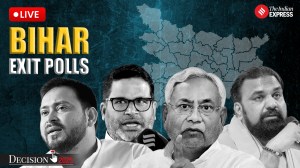‘There’s just one guru who forces you to be efficient and that guru is competition’
Industrialist Rahul Bajaj, who is also a Rajya Sabha MP, spent some time interacting with Express staff. He answered questions on how family-run businesses like his are changing their outlook on how to run the show. He also said the Nano doesn’t give him sleepless nights

• SUBHOMOY BHATTACHARJEE: There is a new type of management structure gaining currency, that is, professionally-run companies. Or non-family firms. You have successfully run a family business where a different structure has evolved over the years. There is renewed interest at institutions such as Harvard in this type of family governance. Would you comment?
In terms of percentages, over 90 per cent of businesses in the US and Europe are still owner-managed. Where is corporate governance in the US? Where is corporate governance in Japan and Korea or Europe?
• COOMI KAPOOR: It is said the Bajaj group has been a beneficiary of the license raj, and when liberalisation came, it was unable to hold its own.
That is a false, inaccurate, misinformed comment. And why pick on Bajaj? Before 1991 under the license-permit raj, we had a shortage economy. But even in a shortage economy you had to survive. In the two-wheeler segment what happened to Lambretta, to Java or Enfield? None of them survived, while there was a 10-year delivery period for Bajaj Chetak. So whether we were efficient or not, did not matter; nor did it matter who was the top manager. You didn’t need to be that efficient. Also, there were limited multinational companies in the market at the time. Post-liberalisation we faced the reality of competition. We had to ask ourselves: how do you learn to be efficient? Which guru do you go to? There is just one guru who not only teaches you to be efficient but also forces you to be efficient, and the name of that guru is competition. So when competition came, you had to be efficient, otherwise you would not survive: you required to lower costs, give the best possible quality, use cutting-edge technology. And you had to see who was the CEO, or the MD. It had to be the most competitive guy available. It could be a relative, a son, a brother or somebody else but it had to be the most efficient person. In the Bajaj family, 98 per cent of wealth is in the equities of the Bajaj Group of companies. So it’s in our selfish interest to get the best guy to manage the company. Today, you can’t have family management if they are not the right people to manage. This is among the reasons why families have split.
• SUBHOMOY BHATTACHARJEE: Who takes the call?
It depends upon the structure of the family. In the case of the Bajaj Group, between 1972 and 1994, it was my uncle. From 1994 onwards, I took the call. You have to competent. If you are not, you are out or should be out. The thing is, if I have to choose between a competent professional and a competent owner, I will choose a competent owner, because he has two things that the professional, for no fault of his, does not have — commitment and continuity.
• SUMANT BANERJEE: As chairman of Bajaj Auto Ltd, why are you unhappy with the budget, considering there is four per cent cut in excise duty? The two-wheeler industry has got something in the budget after approximately 10 years.
I welcome the four per cent reduction to 12 per cent. Till three years ago, there was always a difference in excise duty between four-wheelers and two-wheelers: 24 per cent for four-wheelers and 16 per cent for two-wheelers. Two years ago, Finance Minister P. Chidambaram decided that India will be the hub for small cars, that there will be car exports and the government must do something to encourage growth. So excise was reduced from 24 per cent to 16 per cent for four-wheelers. The two-wheelers were also at 16 per cent. I said, you can consider India as a hub for small cars now, but in two-wheelers and three-wheelers we are already the hub. In 2007-08, Bajaj Auto alone will have exported Rs 2,000 crore-worth of two and three-wheelers. The government was concerned with the slowing growth in the small car segment. In our case, the rate of growth has gone down to negative. Now, small cars have the same excise duty as big cars. I am not saying this is right or wrong. I do not want a further reduction, I am not begging for it, but I am talking logic. Either you accept the logic or you don’t.
• SUMANT BANERJEE: For 13 consecutive months your sales have declined in the two-wheeler segment.
It can’t go down any further — it will go up.
• SUMANT BANERJEE: Is Nano giving you sleepless nights?
Nothing gives me sleepless nights. My problem is getting up in the morning! If there is a Nano, then we will make a second Nano. Ratan Tata has been working to bring out this car for five years. Give my son five years, we will bring out one, too. Either with Nissan-Renault or on our own. Next summer, we will bring out our first four-wheeler, which will be a goods carrier, a pick-up truck carrier like the Ace.
• ZEENAT NAZIR: Two days ago, you were quoted as telling Mr Chidambaram that there should be early elections so that he could come back as finance minister. This comes from an MP who entered the Rajya Sabha with Bharatiya Janata Party and Shiv Sena support. A piquant situation?
I am prepared to say this openly: I want either an NDA (National Democratic Alliance) or a UPA (United Progressive Alliance) government after the next elections. And I want the Congress or BJP to win 200 seats so that they can run the government. If they have only 131-140 seats, it will be a disaster.
• KANDULA SUBRAMANIAM: What is your stand on the Marathi Manoos issue in Maharashtra?
I voted against reservations. I opposed them, openly. We are one country and that means we can stay where we want, we can work where we want. Obviously, Raj Thackeray is not right in his stand against migrants. My view is that if he (Raj) didn’t do this, he would have to leave politics because secular politics will not get him anywhere.
• KANDULA SUBRAMANIAM: What about Balasaheb Thackeray’s poem about Biharis that has been aired on TV channels?
I don’t know the poem. However, I would reiterate this: my family is a Gandhian family, and on this matter whatever Gandhiji stood for, the Bajaj family stands for. I live for that and am prepared to die for that.
• SMITA AGGARWAL: Why did you enter Parliament through the Rajya Sabha route, not the Lok Sabha?
I didn’t choose to enter either House. My father was a member of the Lok Sabha for three terms from my home town, Wardha. But I had no desire to come to Parliament or join politics.
• SUBHOMOY BHATTACHARJEE: You have a family background in politics, and you have handed over the active running of the Bajaj empire to your son. So what prevents you from considering an active political career?
Why should I fight the Lok Sabha elections? Elections are dirty. I am an industralist, I will get a ticket. Some party will give me a ticket. As an industralist I will have to spend Rs 20 crore, Rs 40 crore or Rs 50 crore for that. There are people who spend on getting a Rajya Sabha seat. I have not spent a single paise for the Rajya Sabha seat. That gives me pride. Which industrialist has come to the Rajya Sabha without spending money? Also, I am not sure whether I will win, and then what? I don’t want to do things half-baked. In politics, you have to be available all the time. I am not interested in that. I get up when I want to, sleep when I want to. I am my own master and that’s how I want it to remain.
• ZEENAT NAZIR: Was there no way to avoid shutting down your plant? There have been reports that workers were being paid for not working.
See this in perspective: Bajaj Auto is growing. The two-wheeler segment is going down and so we have also had a fall in the last 12-15 months. That could be one reason for the shutdown, but it was not the main reason. Akrudi is our R&D centre. Bajaj Auto survives because of its R&D. That’s why we are spending up to Rs 100 crore over a five-year period to set up a training and learning centre there. This will be the heart of Bajaj Auto. So that is one main reason behind the move. About some workers, we considered giving them VRS. But they said, ‘No, no, no, the union cannot ask for VRS, it will be finished if it does.’ So for the last two months, the workers are coming and I am still paying them. But there is no work.
• RAKESH SINHA: How do you spend your MPLAD funds?
It’s a big problem. I get Rs 2 crore a year. In the Lok Sabha, you can spend that money in your Lok Sabha constituency. As a Rajya Sabha member, I can spend it anywhere in Maharashtra. I decided I will spend it in Wardha. I have tried to spend the money in Wardha, but some problem or the other crops up all the time. There are so many obstacles. I want to utilise the money properly or not at all.
• COOMI KAPOOR: You are the leading light of the Bombay Club that demanded a level playing field for Indian industry. In retrospect, do you regret the stand of the Bombay Club?
I have regrets about many things but not about the Bombay Club. The media made it out to be what it was not. All the Bombay Club was asking for was a level playing field. It was reported that in Pune the prime minister said that industry should not ask for a level playing field. I wrote a one-and-a-half page letter to PM saying, ‘Sir, you have been quoted to say this. I agree with the fact that a level-playing field does not exist anywhere. I agree with the fact that you should exhort us to become more and more efficient, but when we ask for a level-playing field, we do not expect a 100 per cent level playing field. But worldwide, every industrialist wants a field tilted in his favour.’ I also said in my letter, that it pained me that a prime minister as knowledgeable as Dr Manmohan Singh would make a statement that discourages industrialists. The PM sent me a reply. He said he was trying to exhort us. Please be clear: there is no Bombay Club. I was completely misunderstood by the entire media. Everyone says Rahul Bajaj, Bombay Club protectionist. So be it. I will continue to demand a level-playing field.
(Transcript prepared by Simran Arora)



- 01
- 02
- 03
- 04
- 05




























